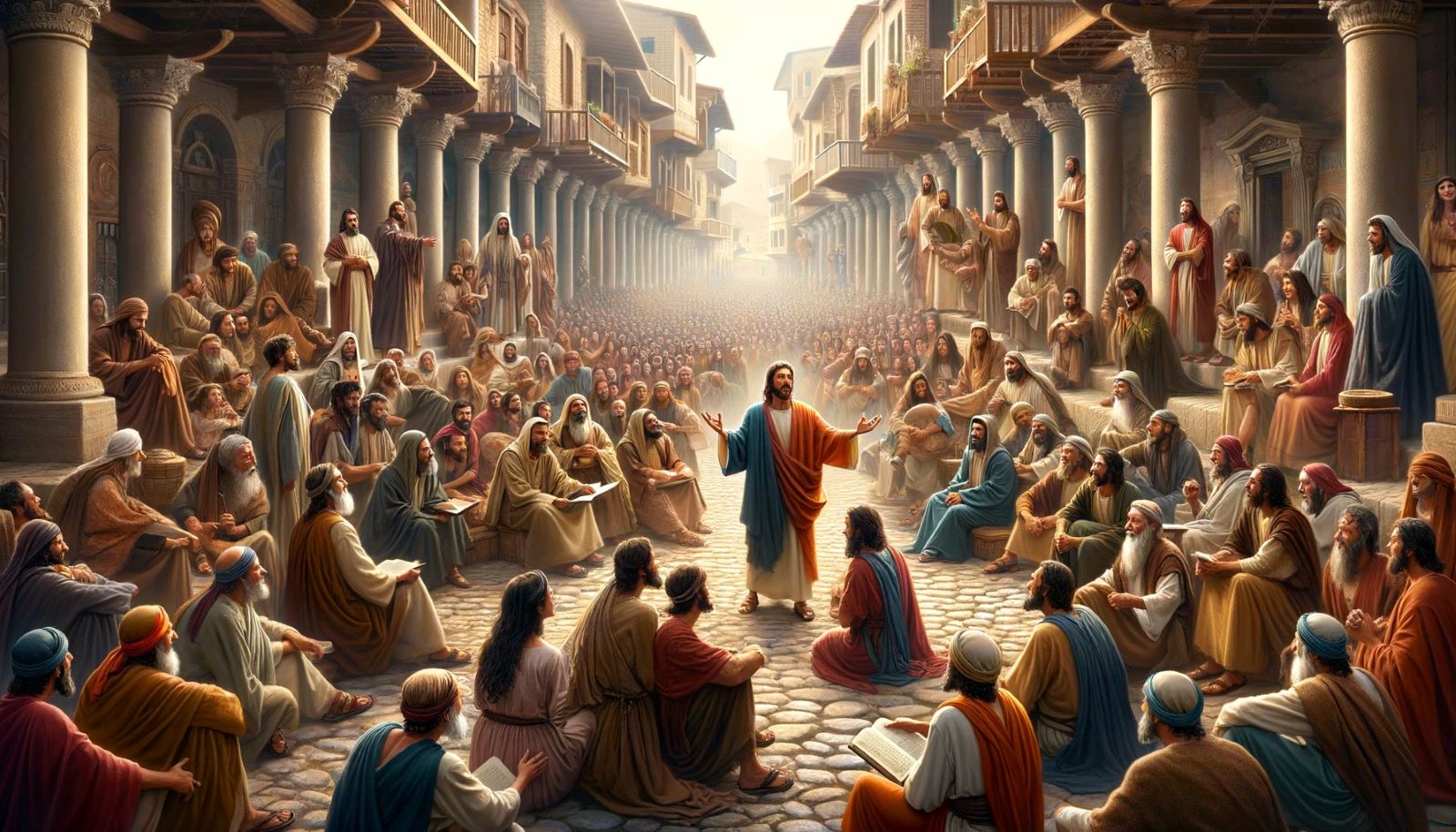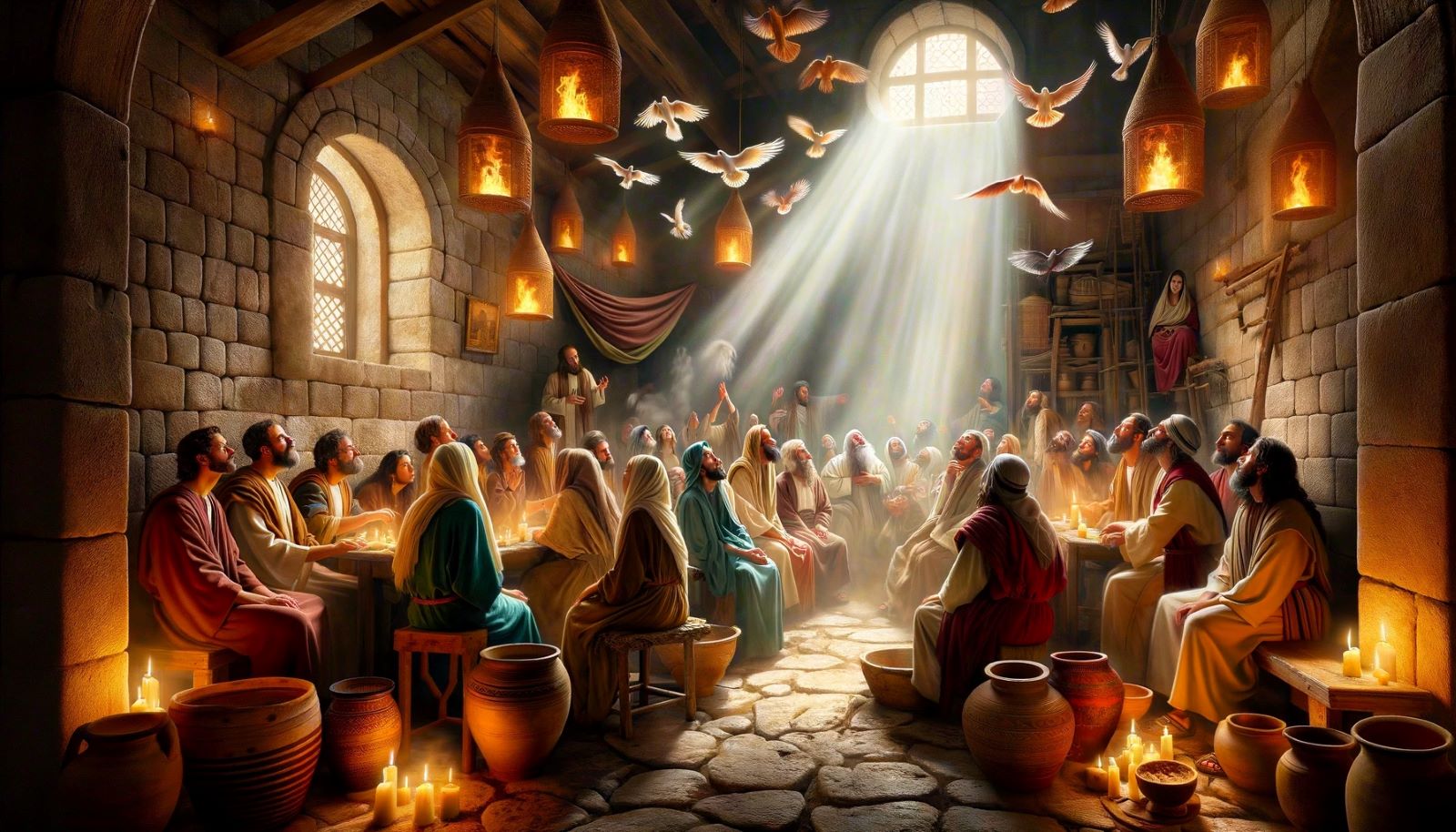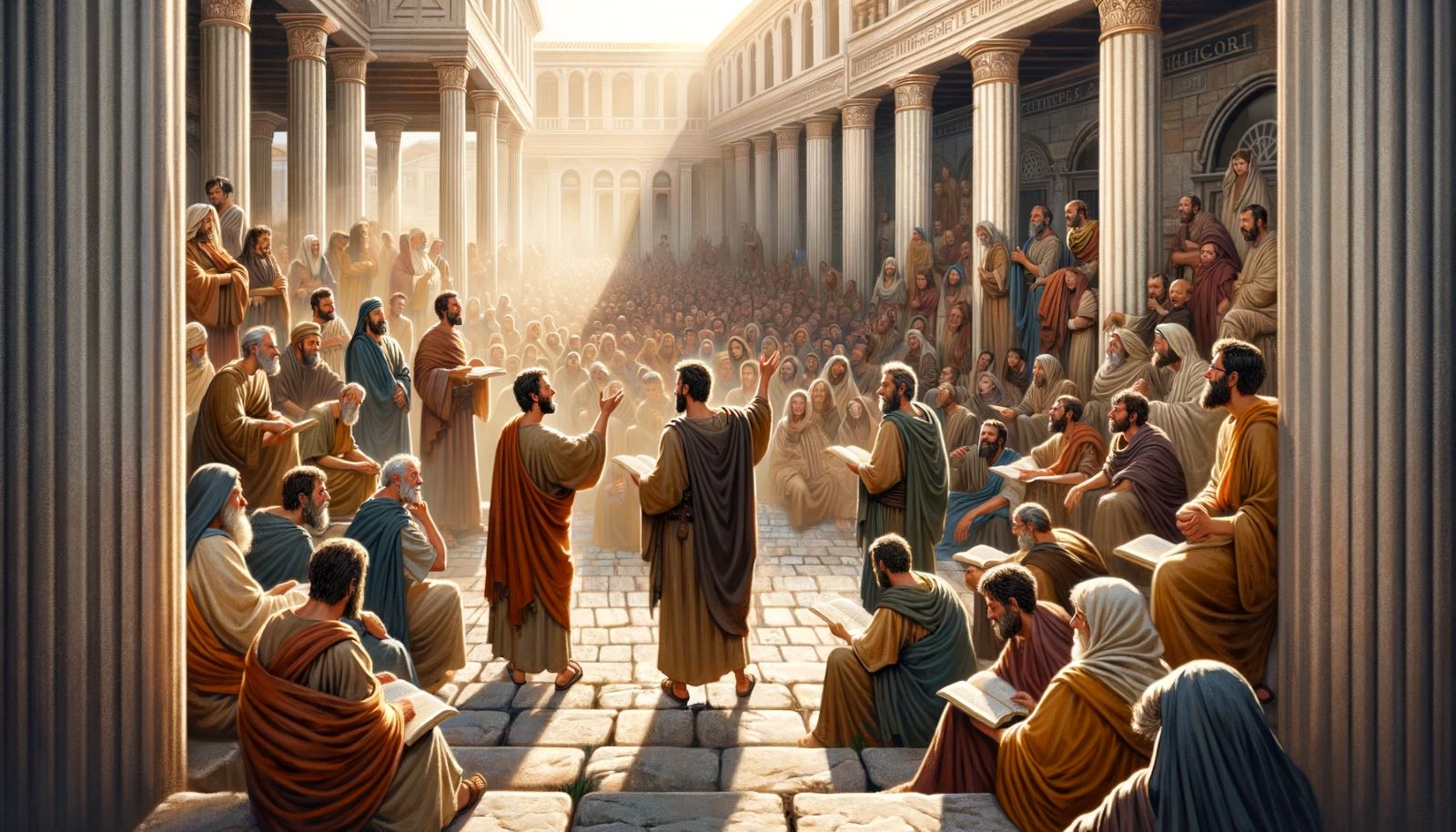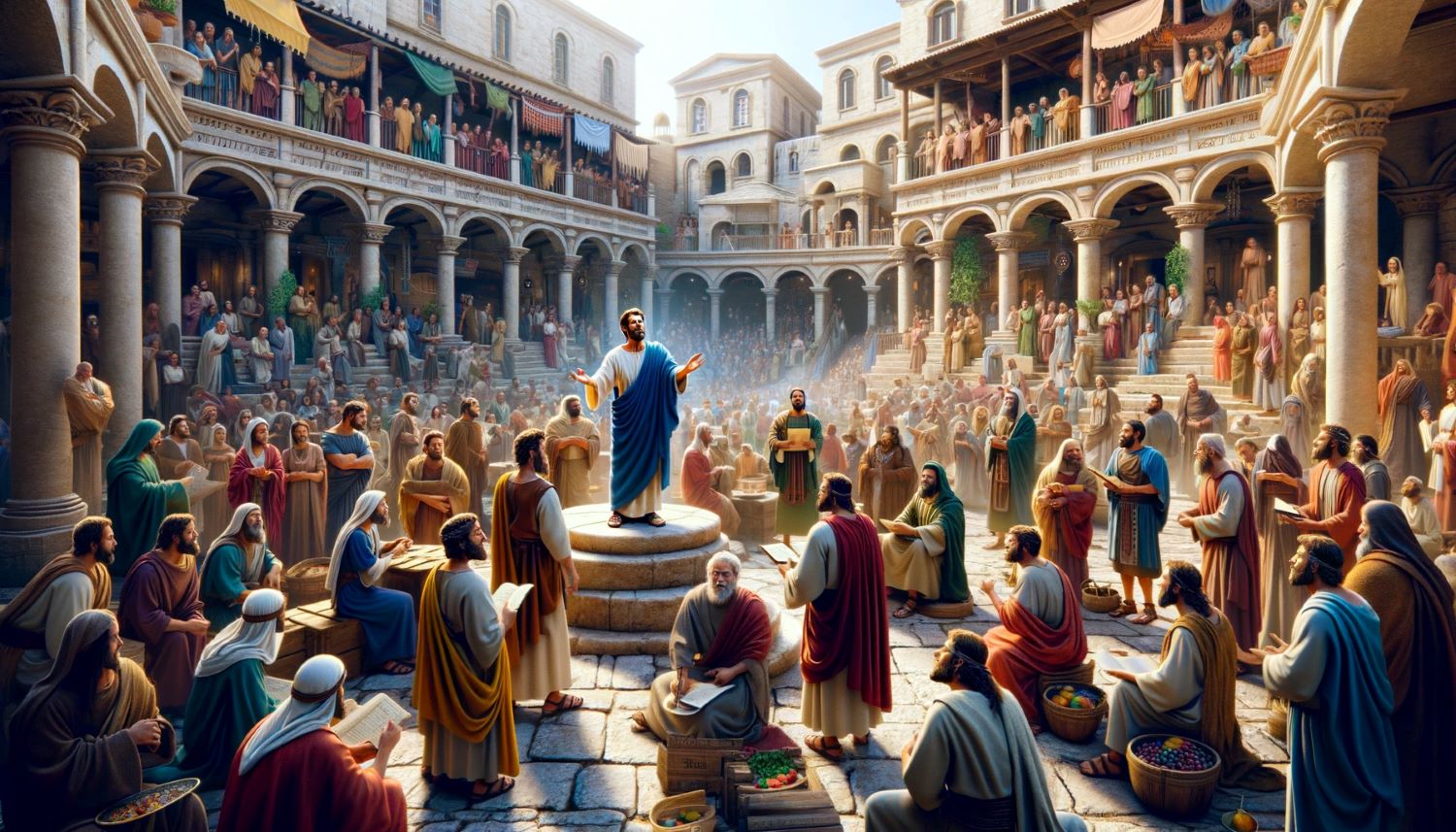Home>Bible Facts>What Is Pentecost And What Was Its Role In The Activities Of The Apostles


Bible Facts
What Is Pentecost And What Was Its Role In The Activities Of The Apostles
Published: February 22, 2024
Jason DeRose, Managing Editor at Christian.net, uses his expertise in religion and journalism to deepen understanding of faith's societal impacts. His editorial leadership, coupled with a strong academic background, enriches the platform’s diverse content, earning him recognition in both journalism and religious circles.
Discover the significance of Pentecost and its impact on the apostles' actions. Explore fascinating Bible facts about Pentecost and its role in early Christianity.
(Many of the links in this article redirect to a specific reviewed product. Your purchase of these products through affiliate links helps to generate commission for Christian.net, at no extra cost. Learn more)
Table of Contents
Introduction
Pentecost, a significant event in the Christian calendar, holds profound historical and spiritual significance. This sacred occasion, also known as the Feast of Weeks, marks the descent of the Holy Spirit upon the apostles and other followers of Jesus Christ. The term "Pentecost" is derived from the Greek word "pentēkostē," meaning "fiftieth," signifying the fifty days that have elapsed since the Passover.
The account of Pentecost is chronicled in the New Testament, specifically in the book of Acts, where it is described as a momentous event that transformed the lives of the apostles and ignited the spread of Christianity. This divine outpouring of the Holy Spirit upon the disciples occurred in Jerusalem, fulfilling the promise made by Jesus before his ascension.
Pentecost is a celebration of spiritual empowerment and renewal, symbolizing the birth of the Christian church and the commencement of its mission to proclaim the gospel to all nations. It serves as a testament to the enduring presence of the Holy Spirit within the Christian faith, inspiring believers to embrace their calling and share the message of salvation.
As we delve into the origins and significance of Pentecost, we gain insight into the pivotal role it played in the activities of the apostles and the profound impact it had on the early Christian church. This momentous occasion continues to resonate within the hearts of believers, serving as a reminder of the enduring power and guidance of the Holy Spirit in the life of the church and its members.
Read more: What Happened To The Apostles On Pentecost
The Origins of Pentecost
The origins of Pentecost can be traced back to the Old Testament, where it was known as the Feast of Weeks. This annual Jewish festival was celebrated seven weeks after the Passover, marking the wheat harvest and offering thanksgiving for the bountiful yield. The Feast of Weeks held great agricultural and religious significance, symbolizing the dependence of the people on God's provision and the abundance of His blessings.
In the New Testament, the significance of Pentecost transcends its agricultural roots, as it became the backdrop for a profound spiritual manifestation. The pivotal event of Pentecost unfolded in Jerusalem, following the ascension of Jesus Christ. The apostles and other followers of Jesus had gathered in one place when suddenly, a sound like a mighty wind filled the house, and tongues of fire appeared, resting on each of them. They were filled with the Holy Spirit and began speaking in different languages, a phenomenon witnessed by Jews from various regions who had gathered in Jerusalem for the festival.
This divine outpouring of the Holy Spirit fulfilled the promise made by Jesus to his disciples, as recorded in the book of Acts. It signified the transition from the Old Covenant to the New Covenant, where the Holy Spirit would indwell believers, empowering them to bear witness to the gospel and carry out the mission entrusted to them. The miraculous display of speaking in tongues served as a powerful sign of God's presence and His intention to reach people of all nations, languages, and cultures with the message of salvation.
The timing of Pentecost was not coincidental, as it coincided with the Jewish Feast of Weeks, thereby drawing the attention of devout Jews from different regions to the extraordinary events unfolding in Jerusalem. This convergence of diverse cultures and languages created a platform for the apostles to proclaim the gospel in a manner that transcended linguistic barriers, laying the foundation for the global spread of Christianity.
The origins of Pentecost, rooted in both the Old and New Testaments, underscore its profound significance as a bridge between the agricultural traditions of ancient Israel and the spiritual awakening that ushered in a new era for the followers of Jesus Christ. This pivotal moment set the stage for the transformative role of Pentecost in the activities of the apostles and the enduring impact it had on the early Christian church.
The Role of Pentecost in the Activities of the Apostles
The outpouring of the Holy Spirit at Pentecost had a profound and transformative impact on the activities of the apostles. Prior to this extraordinary event, the disciples were grappling with fear, uncertainty, and a sense of unpreparedness to carry out the monumental task entrusted to them by Jesus. However, the infusion of the Holy Spirit empowered them in remarkable ways, shaping their actions and emboldening them to fulfill their divine commission.
The apostles, who were once hesitant and apprehensive, were emboldened by the indwelling of the Holy Spirit. They received a supernatural endowment of spiritual gifts, including the ability to speak in tongues, which enabled them to communicate the message of the gospel effectively to people from diverse linguistic and cultural backgrounds. This miraculous manifestation served as a catalyst for the apostles' evangelistic endeavors, as they fearlessly proclaimed the good news of Jesus Christ with clarity and conviction.
Furthermore, the Holy Spirit provided the apostles with wisdom, discernment, and boldness to confront opposition and persecution. They demonstrated unwavering courage in the face of adversity, fearlessly testifying to the truth of the gospel and performing signs and wonders that validated their message. The apostles' actions were no longer driven by human frailty but were infused with divine power, leading to the conversion of multitudes and the establishment of vibrant Christian communities.
Pentecost also catalyzed a profound transformation in the unity and cohesion among the apostles. The diverse group of disciples, once characterized by internal strife and misunderstandings, became unified in purpose and mission under the guidance of the Holy Spirit. They operated in harmony, mutual support, and shared vision, exemplifying the transformative influence of the Spirit in fostering community and collaboration.
The activities of the apostles following Pentecost were marked by a fervent commitment to prayer, teaching, fellowship, and the administration of the sacraments. They shepherded and nurtured the burgeoning Christian community, imparting spiritual guidance and pastoral care with a depth of insight and compassion that transcended human capabilities.
In essence, Pentecost served as the catalyst for a radical transformation in the apostles, equipping them with spiritual fortitude, divine wisdom, and unwavering resolve to advance the kingdom of God. The indwelling of the Holy Spirit propelled the apostles into a new dimension of ministry, enabling them to impact the world with the transformative message of salvation and redemption through Jesus Christ.
The Impact of Pentecost on the Early Christian Church
The outpouring of the Holy Spirit at Pentecost had a profound and enduring impact on the early Christian church, shaping its identity, mission, and growth in remarkable ways. The infusion of the Holy Spirit empowered the believers to embody the teachings of Jesus Christ and to advance the kingdom of God with unwavering conviction and zeal.
One of the most significant impacts of Pentecost on the early Christian church was the emergence of a vibrant and unified community. The diverse group of believers, representing different backgrounds, cultures, and languages, became united in their devotion to the teachings of Jesus and their commitment to spreading the gospel. The indwelling of the Holy Spirit fostered a spirit of harmony, mutual support, and shared purpose among the early Christians, transcending social and cultural barriers.
Furthermore, Pentecost ignited a fervent passion for evangelism and mission. The believers, emboldened by the Holy Spirit, fearlessly proclaimed the message of salvation, resulting in the conversion of multitudes and the establishment of new Christian communities. The miraculous ability to speak in tongues enabled the early Christians to communicate the gospel effectively to people from diverse linguistic and cultural backgrounds, laying the foundation for the global expansion of Christianity.
The impact of Pentecost was also evident in the spiritual transformation and empowerment of individual believers. The Holy Spirit bestowed spiritual gifts upon the early Christians, equipping them for various forms of ministry and service within the church. These gifts, including prophecy, healing, and teaching, contributed to the edification and growth of the Christian community, fostering a sense of spiritual vitality and dynamism.
Moreover, Pentecost catalyzed a deep commitment to communal living and mutual care among the early Christians. They shared their resources, supported one another in times of need, and demonstrated a profound sense of unity and solidarity. This ethos of communal living and mutual support reflected the transformative influence of the Holy Spirit in fostering a community characterized by love, compassion, and selflessness.
In essence, the impact of Pentecost on the early Christian church was multifaceted, encompassing spiritual empowerment, communal unity, fervent evangelism, and a deep commitment to the teachings of Jesus Christ. This pivotal event laid the foundation for the expansion and enduring legacy of the Christian faith, shaping the identity and mission of the church for generations to come.
Conclusion
In conclusion, the significance of Pentecost transcends its historical and religious dimensions, as it embodies the enduring impact of the outpouring of the Holy Spirit on the early Christian church and the activities of the apostles. This pivotal event, rooted in both the Old and New Testaments, serves as a testament to the transformative power of the Holy Spirit in empowering believers, fostering communal unity, and catalyzing fervent evangelism.
Pentecost marked a profound shift in the lives of the apostles, who were emboldened and empowered by the indwelling of the Holy Spirit. Their actions and ministry were no longer driven by human limitations but were infused with divine wisdom, courage, and spiritual gifts. The apostles fearlessly proclaimed the gospel, performed signs and wonders, and nurtured vibrant Christian communities, laying the foundation for the global spread of Christianity.
Furthermore, the impact of Pentecost on the early Christian church was characterized by the emergence of a vibrant and unified community, fervent passion for evangelism, and the spiritual transformation and empowerment of individual believers. The believers, inspired by the Holy Spirit, exemplified a spirit of communal living, mutual support, and unwavering commitment to the teachings of Jesus Christ.
The legacy of Pentecost continues to resonate within the hearts of believers, serving as a reminder of the enduring presence and guidance of the Holy Spirit in the life of the church and its members. It symbolizes the birth of the Christian church and the commencement of its mission to proclaim the gospel to all nations, transcending linguistic and cultural barriers.
As we reflect on the profound impact of Pentecost, we are reminded of the timeless relevance of the Holy Spirit in equipping and empowering believers to advance the kingdom of God. The transformative influence of Pentecost continues to inspire and embolden Christians to embrace their calling, embody the teachings of Jesus Christ, and impact the world with the message of salvation and redemption.
In essence, Pentecost stands as a testament to the enduring legacy of the Holy Spirit within the Christian faith, shaping the identity, mission, and growth of the church with profound significance and timeless relevance.















